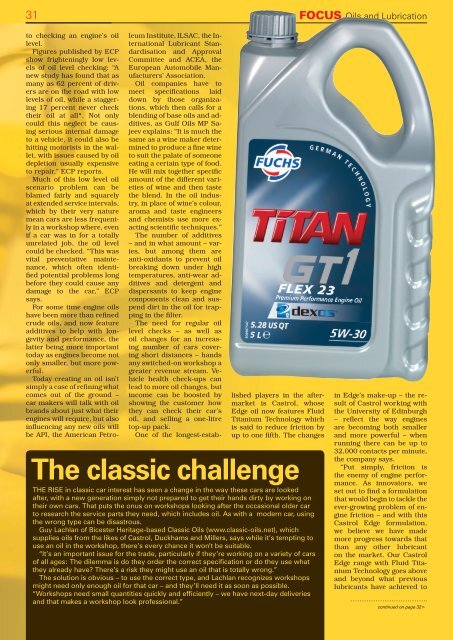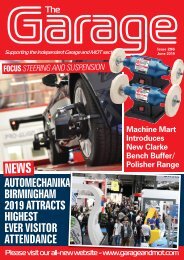The Garage 292
You also want an ePaper? Increase the reach of your titles
YUMPU automatically turns print PDFs into web optimized ePapers that Google loves.
31 FOCUS Oils and Lubrication<br />
to checking an engine’s oil<br />
level.<br />
Figures published by ECP<br />
show frighteningly low levels<br />
of oil level checking: “A<br />
new study has found that as<br />
many as 62 percent of drivers<br />
are on the road with low<br />
levels of oil, while a staggering<br />
17 percent never check<br />
their oil at all*. Not only<br />
could this neglect be causing<br />
serious internal damage<br />
to a vehicle, it could also be<br />
hitting motorists in the wallet,<br />
with issues caused by oil<br />
depletion usually expensive<br />
to repair,” ECP reports.<br />
Much of this low level oil<br />
scenario problem can be<br />
blamed fairly and squarely<br />
at extended service intervals,<br />
which by their very nature<br />
mean cars are less frequently<br />
in a workshop where, even<br />
if a car was in for a totally<br />
unrelated job, the oil level<br />
could be checked. “This was<br />
vital preventative maintenance,<br />
which often identified<br />
potential problems long<br />
before they could cause any<br />
damage to the car,” ECP<br />
says.<br />
For some time engine oils<br />
have been more than refined<br />
crude oils, and now feature<br />
additives to help with longevity<br />
and performance, the<br />
latter being more important<br />
today as engines become not<br />
only smaller, but more powerful.<br />
Today creating an oil isn’t<br />
simply a case of refining what<br />
comes out of the ground –<br />
car makers will talk with oil<br />
brands about just what their<br />
engines will require, but also<br />
influencing any new oils will<br />
be API, the American Petroleum<br />
Institute, ILSAC, the International<br />
Lubricant Standardisation<br />
and Approval<br />
Committee and ACEA, the<br />
European Automobile Manufacturers’<br />
Association.<br />
Oil companies have to<br />
meet specifications laid<br />
down by those organizations,<br />
which then calls for a<br />
blending of base oils and additives,<br />
as Gulf Oils MP Sajeev<br />
explains: “It is much the<br />
same as a wine maker determined<br />
to produce a fine wine<br />
to suit the palate of someone<br />
eating a certain type of food.<br />
He will mix together specific<br />
amount of the different varieties<br />
of wine and then taste<br />
the blend. In the oil industry,<br />
in place of wine’s colour,<br />
aroma and taste engineers<br />
and chemists use more exacting<br />
scientific techniques.”<br />
<strong>The</strong> number of additives<br />
– and in what amount – varies,<br />
but among them are<br />
anti-oxidants to prevent oil<br />
breaking down under high<br />
temperatures, anti-wear additives<br />
and detergent and<br />
dispersants to keep engine<br />
components clean and suspend<br />
dirt in the oil for trapping<br />
in the filter.<br />
<strong>The</strong> need for regular oil<br />
level checks – as well as<br />
oil changes for an increasing<br />
number of cars covering<br />
short distances – hands<br />
any switched-on workshop a<br />
greater revenue stream. Vehicle<br />
health check-ups can<br />
lead to more oil changes, but<br />
income can be boosted by<br />
showing the customer how<br />
they can check their car’s<br />
oil, and selling a one-litre<br />
top-up pack.<br />
One of the longest-estab-<br />
lished players in the aftermarket<br />
is Castrol, whose<br />
Edge oil now features Fluid<br />
Titanium Technology which<br />
is said to reduce friction by<br />
up to one fifth. <strong>The</strong> changes<br />
<strong>The</strong> classic challenge<br />
THE RISE in classic car interest has seen a change in the way these cars are looked<br />
after, with a new generation simply not prepared to get their hands dirty by working on<br />
their own cars. That puts the onus on workshops looking after the occasional older car<br />
to research the service parts they need, which includes oil. As with a modern car, using<br />
the wrong type can be disastrous.<br />
Guy Lachlan of Bicester Heritage-based Classic Oils (www.classic-oils.net), which<br />
supplies oils from the likes of Castrol, Duckhams and Millers, says while it’s tempting to<br />
use an oil in the workshop, there’s every chance it won’t be suitable.<br />
“It’s an important issue for the trade, particularly if they’re working on a variety of cars<br />
of all ages: <strong>The</strong> dilemma is do they order the correct specification or do they use what<br />
they already have? <strong>The</strong>re’s a risk they might use an oil that is totally wrong.”<br />
<strong>The</strong> solution is obvious – to use the correct type, and Lachlan recognizes workshops<br />
might need only enough oil for that car – and they’ll need it as soon as possible.<br />
“Workshops need small quantities quickly and efficiently – we have next-day deliveries<br />
and that makes a workshop look professional.”<br />
in Edge’s make-up – the result<br />
of Castrol working with<br />
the University of Edinburgh<br />
– reflect the way engines<br />
are becoming both smaller<br />
and more powerful – when<br />
running there can be up to<br />
32,000 contacts per minute,<br />
the company says.<br />
“Put simply, friction is<br />
the enemy of engine performance.<br />
As innovators, we<br />
set out to find a formulation<br />
that would begin to tackle the<br />
ever-growing problem of engine<br />
friction – and with this<br />
Castrol Edge formulation,<br />
we believe we have made<br />
more progress towards that<br />
than any other lubricant<br />
on the market. Our Castrol<br />
Edge range with Fluid Titanium<br />
Technology goes above<br />
and beyond what previous<br />
lubricants have achieved to<br />
continued on page 32><br />
30, 31, 32, 33 Oils and Lubrication.indd 2 28/03/2019 14:33
















